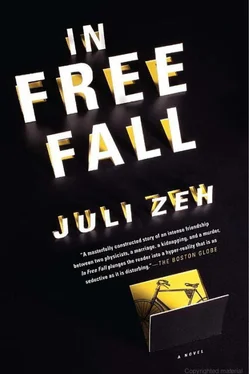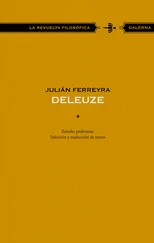ON THE RUE DE LA NAVIGATION, he signals his name with the doorbell—short, long, short-short—and knows within seconds that Oskar is out. He wraps his jacket tightly around him and takes up his position in the entryway. Exhaustion has given way to restlessness. Newspapers tumble through the streets, a cyclist flaps past, and a siren sounds somewhere. Sebastian normally loves the anticipation that accompanies his visits to Oskar in Geneva. Despite all the changes in their lives, he and Oskar have kept a piece of the past here that seems like it will live forever. Sebastian has come here over and over again like an addict because, up there in the attic apartment, he is a god, in control of all the fulfilled and unfulfilled potential of his life. That attic is the source of his strength and life force, and also of the restlessness that now has him shifting from one foot to the other.
When a rowdy bunch of nocturnal revelers approach, bound by some giant embrace into a single being, and shout at him in German, asking where to find the best nightclub, he pushes himself away from the wall and disappears into the darkness.
The blue circle of neon lights that serves as the sign for Le Cercle Est Rond is not complete. One of the lights broke years ago, so the circle is open on one side. The bins shoved into the middle of the pavement, and several stray cats, keep the tourists away; since the red-light district was recommended as an insider’s tip in several travel guides, Oskar has been talking about looking for a new apartment. He often says that those who go to the Cercle are the last people left on the planet who go out in order not to be recognized.
The room is lit by candles jammed into empty bottles, and the light sketches the souls of people and objects in flickering shadows on the walls. The tables seem to be more for beer-drinking card players than for the well-dressed men who sit at them in twos or threes, drinking red wine. The men speak in low voices and move cautiously, as if they are trying not to frighten each other.
Sebastian pushes aside the leather curtain at the entrance. The bartender, who is washing glasses under the only electric light in the room, does not even acknowledge him with a glance, though they have known each other for a long time. Oskar is leaning back against the bar, and a lanky young man wearing round-rimmed spectacles is standing in front of him, talking eagerly in the direction of his own feet. It is not possible to tell if Oskar is listening to him as he stands there with his legs crossed and his elbows bent, motionless. His hands are dangling beside him in an attitude of courtesy mingled with lordliness, as if he were allowing a beringed finger to be kissed. In this position, he looks like he could be leaning against a tree trunk in a forest clearing in the morning mist, his white shirt open at the collar, holding a pistol in his hands.
He allows himself little more than an arch of the eyebrows when he notices Sebastian. But Sebastian can see that his friend is shaken to the core. He almost expects Oskar to clutch his hands to his heart and sink to his knees. He has known this man for half a lifetime, and he has never seen him so shaken.
The bespectacled young man has not noticed that anything has changed. His eyes dart here and there behind his glasses as he is speaking, and when he finally raises his head because he has not received a reply to a question, his age nudges eighteen. Sebastian knows these young geniuses who come from afar to discuss the theory of the quantization of time with its renowned originator. In a pub in Geneva, they meet a man who adorns his intellect not with white hair and a face furrowed by thought, but with a classically handsome profile and a smile proclaiming the right to ownership. Oskar puts his mouth close to the young man’s ear and whispers something. The boy immediately raises his hand and walks off toward the restroom.
Within seconds, they are standing opposite each other. It is Oskar who stretches his hand out first. No one can keep himself afloat day after day all on his own. The mingling of their scents is an invisible home. It houses the pain they feel about the space they share, a space that knows only biting cold and blistering heat, but not the conditions for human survival.
Oskar takes the “Reserved” placard off the table in the corner and sits Sebastian down facing a kitsch reproduction of a still life. It portrays a pheasant in its dress of feathers, its neck hanging broken over the edge of a bowl. Sitting opposite Sebastian, Oskar has a view of the whole room. Unbidden, the barman brings over two glasses and a bottle of whiskey that is as old as the bespectacled youth who has left the Cercle after his visit to the restroom. They clink glasses and drink. Oskar is outwardly calm. He does not tap his feet, or pick fluff off his suit trousers. He looks at Sebastian intently.
Sebastian is tracing the grain of the table with a finger, concentrating on not counting the years, not asking how many times he has sat in the Cercle filled with a delicate mixture of happiness and fear. Seen from here, his normal life seems like the memory of a film in which he, Maike, and Liam play the touching lead roles. Every time he has left Freiburg on the weekend for a supposed conference, Oskar has been waiting for him with eyebrows raised—mocking and acerbic, but not angry.
Perhaps Oskar’s supreme quality is not his intelligence, thinks Sebastian, but his patience, which has the force of a natural law. “How time flies” is never a statement for Oskar, always a question.
And perhaps, Sebastian thinks, Maike and Liam’s supreme quality is their boundless trust, while his own is the ability to abuse this trust without scruple. “Can that really be true?” is never a question for Sebastian, but always a matter of physics.
His index finger traces the grain of the wood on the other side of the table and when Oskar reaches out to grasp it, he gives him his hand.
“It can only be days now,” Sebastian says.
“Hours,” Oskar says.
“A detective is onto me. Either he understands nothing—or everything.”
“Everything, probably. Or were you foolish enough to hope that they wouldn’t find you?”
“Hope is the last thing to die,” Sebastian says lamely.
“And honor never does.”
Oskar drinks from his glass, then puts it down on the table.
“ Cher ami ,” he says, “there is this thing called life and there are stories. The curse of the human being is that he finds it difficult to distinguish between the two.”
“Say it again.”
“What?”
“When I told you about Dabbelink on the phone, what did you say?”
“‘Oh?’” Oskar says.
“I’ve been surviving on that ‘Oh?’ for forty-eight hours.”
Oskar presses his hand.
“Is that why you came?”
Sebastian does not reply. He turns in his seat and looks around the room.
“I’ve made inquiries,” Oskar says. “It’s known as coercion. Anyone blackmailed into committing a crime cannot be held responsible.”
“I’m responsible, without a doubt.”
The bartender is drying glasses and the customers are talking among themselves. No one is paying the least bit of attention to the table in the corner. Amazingly, everything looks normal.
“That’s the first time I’ve heard you say that,” Oskar says. “Are you afraid that they won’t believe you were blackmailed?”
“It’s not that.”
“Maik?”
Sebastian nods.
“Does she know?”
Sebastian shrugs his shoulders.
“You haven’t told her… everything?”
Sebastian shakes his head. He pulls the bottle toward him and empties his second glass in a single gulp. Peat and a touch of honey, it’s a good make. Oskar lights a cigarette and looks toward the window, which merely reflects his own face back at him. Sebastian’s hand grows numb in Oskar’s grip, and he pulls it away.
Читать дальше












